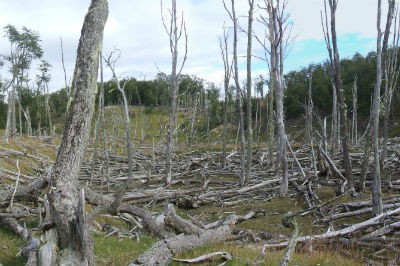
“In spite of this clear consensus, there have been no clear standards or protocols that managers can use,” said Chris Anderson, a socioecologist at the Austral Center for Scientific Research in Argentina, an adjunct professor in Virginia Tech’s College of Natural Resources and Environment, and co-author of a study published in Science this month.
In the article, experts in ecology, economics, law, political science, geography, and philosophy outline “four core principles of scientifically based, workable, and comprehensive restoration that can provide appropriate best practice guidelines in legal, policy, and planning efforts.”
To maximize such benefits as conserved biodiversity and sustained livelihoods, ecological restoration should increase ecological integrity, be sustainable in the long term, be informed by the past and future, and benefit and engage society. Adherence to these principles will add clarity, accountability, and accomplishment in this new era of embracing ecological restoration as an environmental policy tool, the experts write.
“Initiatives that emphasize one principle over the full suite are not true restoration — and therefore are insufficient to address restoration goals,” said Katharine Suding, a community ecologist at the University of Colorado and lead author of the paper.
It will be tempting to consider specialized projects that emphasize one principle rather than attending to the full suite of potential opportunities, the authors warn. “Degraded lands could be converted to carbon farms, where monocultures of fast-growing tree species are planted and managed to optimize carbon sequestration. Green infrastructure could provide vegetation that fixes carbon and increases permeable surfaces.”
In a case from Appalachia, the authors point to compensatory mitigation for mountaintop removal mining as an example of so-called restoration that fails to hit the mark. Coal companies are required by federal law to avoid, minimize, and mitigate the destructive impacts of their operations on waterways, but regulatory criteria for restoration do not match up with fundamental scientific standards.
“As valuable as these strategies may be, they alone do not constitute comprehensive ecological restoration. To contribute to our commitment to restore, the scope of these strategies should be broadened to include all restoration principles,” the article emphasizes.
“It’s critical that policy and planning documents consider in detail what restoration means and what it looks like to ensure these projects have meaningful, long-term results,” Suding said.
Anderson has been working with a team that includes Assistant Professor Michael Sorice and master’s student Anna Santo, from St. Paul, Minnesota, both of Virginia Tech’s Department of Forest Resources and Environmental, as well as Argentine and Chilean colleagues to better understand how to restore forests destroyed by North American beaver along rivers and streams on the Tierra del Fuego Archipelago at the southern tip of South America. The beavers were originally brought in by the Argentine government in 1946 with the intention of improving the area’s ecosystem.
“In 2008, Argentina and Chile signed an agreement to promote the restoration of forests that had been degraded by invasive North American beavers,” Anderson said. “However, the agreement is very imprecise on how such a grand initiative should be implemented.
“We have obtained funding from the U.S. National Science Foundation to study the coupled human and natural dimensions that are required to holistically address restoration in southern Patagonia. Adherence to the four principles will help focus the effort and obtain maximum benefits without unintended negative consequences.”










